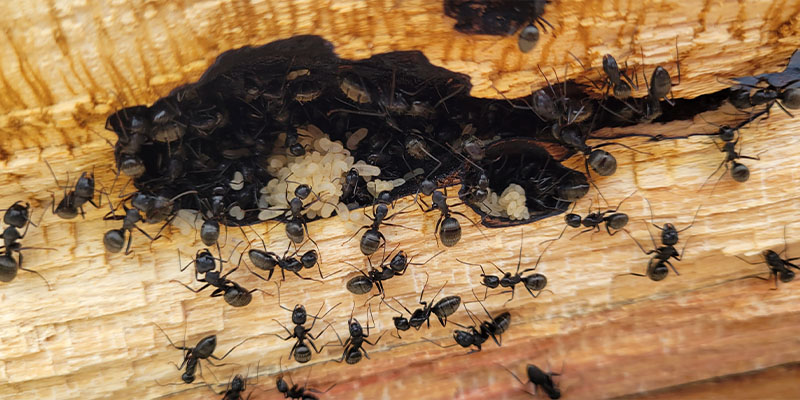How Fast Can Carpenter Ants Destroy a House?
When it comes to wood-destroying insects, carpenter ants and termites are two of the most notorious. Both pests can cause significant damage to homes and other structures, but which one is worse? In the following blog post, we will compare and contrast carpenter ants and termites to determine which is the more destructive pest.
What’s Worse – Carpenter Ants or Termites?
Let’s start with physical differences. Carpenter ants and termites have distinct physical differences that can help you identify which pest you are dealing with. Carpenter ants have a narrow waist, elbowed antennae, and a smooth, rounded thorax. Termites, on the other hand, have a broad waist, straight antennae, and a flat, rectangular thorax.
Behavioral Differences
Carpenter ants and termites also have different behaviors that can help you determine which pest you are dealing with. Carpenter ants are primarily nocturnal and are most active at night. They are attracted to moisture and often nest in damp wood. Termites, on the other hand, are active during the day and are attracted to light. They often build their nests in the ground and tunnel through wood to reach food sources.
Damage Caused
Carpenter ants and termites both cause damage to wood, but the extent of the damage can vary. Carpenter ants excavate wood to create their nests, but they do not consume the wood. Termites, on the other hand, do consume wood as their primary food source. As a result, termites can cause more extensive damage to wood than carpenter ants. However, this doesn’t necessarily mean that carpenter ants are not able to cause substantial damage too.
Prevention and Control
Since both termites and carpenter ants can inflict significant damage, it’s important to know how to keep them out. The best way to prevent and control carpenter ants and termites is to take steps to make your home less attractive to these pests. This includes doing the following:
- Removing sources of moisture, such as leaky pipes and clogged gutters.
- Sealing cracks and gaps in your home’s foundation and exterior walls.
- Storing firewood and other wood products away from your home.
- Keeping your yard free of debris and clutter.
If you already have an infestation of carpenter ants or termites, it is very important to contact a pest control professional for proper identification and treatment as soon as possible because even if it doesn’t appear like there’s a lot of damage, it’s what you can’t see that could prove to be the most instructive as to the extent of the problem.
As you can see, carpenter ants and termites are both destructive pests that can cause significant damage to homes and other structures. However, termites are generally considered to be worse than carpenter ants due to their ability to consume wood and cause more extensive damage.
So, if you suspect you have an infestation of either pest, it is important to contact a pest control professional as soon as you can for proper identification and treatment.
How Fast Can Carpenter Ants Destroy a House?
Carpenter ants are a common household pest that can cause significant damage to homes and other wooden structures. These small insects are known for their ability to tunnel through wood, creating intricate networks of galleries and tunnels as they search for food and shelter. But just how fast can carpenter ants destroy a house? That’s a good question. To answer it, we’ll have to explore the factors that influence the rate of carpenter ant damage and provide tips for preventing and controlling these destructive pests.
What Are Carpenter Ants?
Let’s begin by explaining what carpenter ants are. These insects are a species of ant that is known for its ability to tunnel through wood. They are typically black or dark brown in their coloring and can grow up to 1/2 inch in length. Carpenter ants do not eat wood, but instead, they excavate it to create their nests. As a result, this can cause significant damage to wooden structures over time.
Factors That Influence the Rate of Carpenter Ant Damage
Now, just how fast can these pests wreak havoc on a property? The rate at which carpenter ants can destroy a house depends on several factors, including:
- The size of the colony. The larger the colony, the faster it can cause damage. Carpenter ant colonies can grow to contain thousands of individuals, and as the colony grows, so does its ability to cause damage.
- The age of the wood. Older wood is more susceptible to damage from carpenter ants. This is because it is often softer and more easily tunneled through.
- The moisture content of the wood. Carpenter ants are attracted to wood that is either damp or wet. This is because it is easier to tunnel through and provides a good source of water for the colony.
Lastly, the location of the nest. Carpenter ants prefer to build their nests in areas that are protected from the elements, such as inside walls or under floors. This can make it more difficult to detect and control an infestation.
Preventing and Controlling Carpenter Ants
Because so much is at stake, it’s obviously important to know how to keep them from showing up and becoming a costly problem. There are several steps you can take to prevent and control carpenter ant infestations:
- Keep your home dry. Carpenter ants are attracted to both damp and wet wood, so it is important to keep your home dry. Fix any leaks, and make sure that your gutters and downspouts are functioning properly.
- Seal cracks and gaps. Carpenter ants can enter your home through small cracks and gaps. Seal any openings around windows, doors, and pipes to prevent them from getting inside.
- Remove potential food sources. Carpenter ants are attracted to sweet and sugary foods. Keep your kitchen clean and store food in airtight containers to prevent them from finding a food source in your home.
- Call a professional. If you suspect that you have a carpenter ant infestation, it is highly advisable to call a pest control professional. They can identify the source of the problem and provide the appropriate treatment to eliminate the colony.
In summary, carpenter ants can cause significant damage to homes and other wooden structures if left unchecked. The rate at which they can destroy a house depends on several factors, including the size of the colony, the age of the wood, the moisture content of the wood, and the location of the nest. By taking steps to prevent and control carpenter ant infestations, you can help protect your home and prevent costly damage.
If you think your house is under attack from carpenter ants or you’ve seen other pests around or inside your home, get in touch with us. We’ll assess the situation and recommend the best course of action to deal with the problem at hand.

